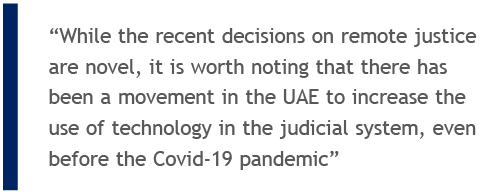By Abdulla Galadari, Ken Dixon and Fadi Hassoun of Galadari Advocates & Legal Consultants
E: abdulla@galadarilaw.com
E: ken@galadarilaw.com
E: fadi@galadarilaw.com
A rapid response has been needed to control the coronavirus outbreak, but it remains to be seen how permanent the changes will be.
The full nature and extent of the Covid-19 pandemic is yet unknown and is still indeterminable. What is certain however is that the consequences will be far reaching, likely to endure for some time, and that change is inevitable.
Across the globe the movement restrictions have resulted in the closure of businesses and the effective grinding to a halt of the economies of whole nations. As the pandemic continues UAE lawmakers have been forced to apply a reactive approach in addition to their typically proactive stance, to continuously re-assess the position and amend and make additional regulations to restrict the spread of the virus.
Remote justice
Amid the Covid-19 pandemic, courts, including arbitral tribunals, have been forced to quickly adapt to the current status quo governed by state measures imposing quarantines, sanitary cordons and social distancing. It is safe to say that the UAE have exhibited a commendable approach in maintaining, to the extent possible, the continuity of access to justice and the operation of judicial bodies.
It has become apparent that the default position among courts of most jurisdictions is to provide remote access to justice. The success of such remote access to justice will depend on the level of technological infrastructure and the flexibility of procedural rules vis-a-vis remote proceedings. A jurisdiction with a digitised system and supple procedural rules is likely to face less hurdles and impairments in conducting proceedings remotely.
Several recent decisions were issued by relevant UAE judicial bodies to encourage and regulate the remote access to justice and the continuation of judicial services. In this context, the President of Abu Dhabi Judicial Department issued on March 30, 2020 the Administrative Decision No. 61 of 2020, which provides for specific procedures to ensure the continuation of judicial services during the Covid-19 pandemic and which predominantly include procedures for remote operations. Similarly, the President of Dubai Courts issued on April 18, 2020 the Decision No. 33 of 2020 relating to remote litigation procedures and courts’ services.

While the recent decisions on remote justice are novel, it is worth noting that there has been a movement in the UAE to increase the use of technology in the judicial system, even before the Covid-19 pandemic and e-litigation has been gaining momentum in light of the recent measures taken to offset the effects of the Covid-19 pandemic on the conduct of judicial operations. This has been reflected in several dispute resolution forums across the UAE, including the Dubai and Abu Dhabi onshore and offshore courts and various arbitration centres.
Although active measures have been taken by the UAE to enable remote access to justice, it remains crucial to carefully monitor how the judiciary and legal practitioners are implementing such measures. However, in such testing times, access to justice remotely presents a valuable opportunity which would not have been possible without the existing technological and legal infrastructure in the UAE. Remote justice may be the best solution for the time being but could also remain as a viable option even after the Covid-19 pandemic is resolved.
Regulatory changes in the UAE
It is reasonably certain that once the pandemic is over or under manageable control, that the UAE government must do everything in its power to kickstart, stimulate and assist in the regrowth of trade and businesses. A way in which this can be done is through regulatory changes, and due to a predominantly expat population, these regulatory changes will be heavily influenced by a desire to retain the primarily foreign workforce and attract foreign investment.
During the pandemic we have seen several regulatory changes made in the UAE to assist in easing the obvious impact on businesses. The government announced the introduction of its official portal (u.ae) aimed at providing remote “end to end” digital services to enable working smartly and efficiently, unrestricted by office hours or personal interaction.
At the end of March, the UAE Cabinet issued Ministerial Decree Number 20-2020, which introduced reductions on official fees applicable to in excess of one hundred different services of the UAE Ministry of Economy. Incentives have not only been introduced for businesses operating outside of the Free Zones. The Dubai Free Zones Council has introduced a stimulus package which includes rental payment deferrals for periods of up to six months, reimbursement/release of security deposits and guarantees, the waiver of penalties and measures to allow for certain payments in monthly instalments.
Whether the regulatory changes introduced will remain after the pandemic is over will remain to be seen, but it is highly likely that they will, at least for a certain period of time, and that others will also be introduced to assist in business re-generation in the UAE. This may well result in the creation of more online and virtual platforms, a reduction of required manpower to staff businesses and substantial changes, certainly to some types of businesses, to the employment laws applicable to those types of businesses.

Force Majeure
Where legislation related to force majeure has not been updated or changed in the UAE due to Covid-19, as has been discussed at great length, is significant during the current pandemic and certainly worth mentioning, as in circumstances where contractual obligation cannot be fulfilled or may impend the operation of a business, leaders turn to ‘force majeure’.
There is substantial jurisprudence on force majeure clauses in contracts and their interpretation within varied fact-based scenarios and events, however as the current pandemic is unique and unforeseen, little to no contract will make specific reference to this event. There is a probability that the word ‘pandemic’ has been specifically incorporated in force majeure clauses, which in correlation to the WHO notification may be used as a defence of force majeure by a party. However, in scenarios where neither the terms Covid-19 or pandemic are incorporated in a force majeure clause, can parties rely on other typical clause terms? That is, can it be argued that the pandemic is an unforeseeable event or an act of god?
Under UAE law the force majeure equivalent can be found in the provisions relating to impossibility and partial impossibility in the UAE Federal Law No.5 of 1985 (“Civil Code”).
Article 273 of the Civil Code permits relief for financial hardship and performance obligations. In the event of impossibility, the courts can declare the contract is cancelled and the obligations of the parties shall cease. However, in cases of partial impossibility only that part of the contract which becomes impossible to perform is extinguished.
Courts in the UAE will investigate the facts of the case to determine impossibility or partial impossibility, in particular:
- Has the pandemic and ensuing governmental regulations made the performance of the contract impossible.
- Is there scope for renegotiating the terms and timing of the performance obligations.
Each contractual obligation and commitment will be unique to the parties involved and should therefore be reviewed on a case-by-case basis. While organisations may experience challenges in fulfilling contractual obligations, it is essential to consider the legal ramifications of using the pandemic as a justification for non-performance, therefore a thorough case and contract analysis is conducted before aiming to exit under the force majeure clause.

E: abdulla@galadarilaw.com
E: ken@galadarilaw.com
E: fadi@galadarilaw.com
![]() Click Here to read the full issue of Asian-mena Counsel.
Click Here to read the full issue of Asian-mena Counsel.



